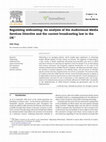Books by Işık Önay

Wolters Kluwer , 2020
Introduction to Turkish Law reflects major changes in Turkish law that had happened after the pub... more Introduction to Turkish Law reflects major changes in Turkish law that had happened after the publication of the sixth edition. This edition covers the most significant of these changes, including the constitutional amendment of 2017 leading to a radical change of the system of government and introduction of new versions of three major codes: Turkish Code of Obligations, Turkish Commercial Code and Code of Civil Procedure. Encompassing all the major fields of legal practice, this edition provides an essential understanding of the Turkish legal system to enable users to become familiar with the law and legal processes in Turkey.
What’s in this book:
Twelve chapters, written by Turkish experts and scholars in their areas of specialty, focus on particular fields and provide the Turkish equivalents of the English terminology. The book covers the following topics:
sources of Turkish law;
constitutional law;
administrative law;
legal persons and business associations;
family law;
law of succession;
law of property;
law of obligations;
penal law; and
laws of civil and penal procedures.

Yenileme (tecdit), Türk Borçlar Kanunu'nun 133. ve 134. maddelerinde, borçların ve borç ilişkiler... more Yenileme (tecdit), Türk Borçlar Kanunu'nun 133. ve 134. maddelerinde, borçların ve borç ilişkilerinin sona erme halleri arasında düzenlenmektedir. Borçlar hukukunun temel kavramları arasında yer alan yenileme, hukuk öğretisinde hep tartışmalı bir konu olagelmiştir. Bu tartışmalardan bazılarına örnek olarak, yenilemenin borçlar hukukunda ihtiyaç duyulan bir kurum olup olmadığı sorunu ve yenilemenin teminatlar üzerinde doğuracağı etki örnek olarak verilebilir. Ayrıca yenilemenin benzer hukuki kurumlarla olan ilişkisi ve bunlardan ayırt edilmesinde de hukuki problemlerle karşılaşılır. Elinizde tuttuğunuz, doktora tezi olarak hazırlanan bu kitapta, anılan sorunlar, yenilemenin tarihi gelişimi, öğretide ileri sürülen görüşler ve mahkeme içtihatlarından yararlanmak suretiyle incelenmiştir. Kitabın ilk bölümünde yenilemenin tarihi gelişimi, tezin ağırlık noktasını oluşturan ikinci ve üçüncü bölümlerde ise sırasıyla yenilemenin hukuki niteliği, şartları ve sonuçları ile benzer kurumlarla olan ilişkisi incelenmiştir. -----------------------------------------------------------------------------------------------------------------
Novation is regulated under articles 133 and 134 of the Turkish Code of Obligations under the title “Extinction of obligations”. Novation, having its roots in Roman law, is shortly defined as the replacement of an existing obligation by a newly created one. In spite of being an indispensable institution under Roman law, today novation’s significance is questioned in modern law of obligations. The discussions surrounding its legal nature in ius commune rendered novation an inscrutable concept. This dissertation, aiming at shedding light on this obscure concept, examines in its first chapter, novation’s historical background starting from the classical period of Roman law and enquires into novation’s functions under modern legal systems. The second chapter deals with novation’s legal nature, its conditions and legal consequences. In the final chapter of the dissertation, novation is compared and contrasted with amendment of the oblligation, settlement, contracts affecting a change in parties, discharge of obligation and performance in lieu of fulfilment (datio in solutum). The final chapter also points out legal transactions falsely characterized as novation and examines the legal nature of those. In light of the issues discussed throughout the dissertation, the dissertation concludes with observations on novation’s role and function in law of obligations.
Papers by Işık Önay
Ankara Üniversitesi Hukuk Fakültesi Dergisi, 2011
... 11 Bkz. Nomer/Şanlı, s. 277-278; Çelikel/Erdem, s. 272; Tekinalp, s. 216-217. 12 Bu yönde gör... more ... 11 Bkz. Nomer/Şanlı, s. 277-278; Çelikel/Erdem, s. 272; Tekinalp, s. 216-217. 12 Bu yönde görüş için bkz. ... Ayrıca, Yargıtay 3.12.1981 ve 6.5.1982 tarihli iki kararında tarafların millî hukuklarının beraber uygulanacağına hükmetmiştir (Çelikel/Erdem, s. 272, dn. 39'ten naklen). ...
Banka ve Ticaret Hukuku Dergisi, 2019
Özet ve giriş ekli dosyada bulunmaktadır. Abstract and introduction are provided in the attached ... more Özet ve giriş ekli dosyada bulunmaktadır. Abstract and introduction are provided in the attached file.

İstanbul Hukuk Mecmuası, 2019
Zorunluluk hâline ilişkin olarak Türk öğretisinde bugüne kadar yapılmış çalışmalarda konunun mede... more Zorunluluk hâline ilişkin olarak Türk öğretisinde bugüne kadar yapılmış çalışmalarda konunun medeni hukuk ve ceza hukuku bakımından çoğunlukla ayrı ayrı ele alındığı görülmektedir. Hâlbuki konunun medeni hukuk ve ceza hukuku arasındaki etkileşim dikkate alınarak, hukuk düzeninin birliği ilkesi ışığında incelenmesi bir gerekliliktir. Özellikle Türk Ceza Kanunu ve Ceza Muhakemesi Kanunu’nun 01.06.2005’te yürürlüğe girmesinden sonra zorunluluk hâlinin hukuki niteliği ceza hukuku öğretisinde yoğun bir şekilde tartışılmış, fakat bu tartışmalarda, zorunluluk hâlinin medeni hukuk bakımından bir hukuka uygunluk sebebi teşkil ettiği ve bunun doğurduğu sonuçlar yeterince dikkate alınmamıştır. Bu çalışmada zorunluluk hâli hem medeni hukuk hem de ceza hukuku açısından bu bakış açısıyla ele alınmakta ve hukukun bu iki disiplini arasındaki etkileşime dikkat çekilmektedir. Çalışmada öncelikle hukuk düzeninin birliği ilkesi hakkında genel açıklamalara yer verilmekte, ardından sırasıyla medeni hukuk ve ceza hukuku açısından zorunluluk hâli incelenmektedir. Yapılan değerlendirmeler sonucunda CMK m 223/3-c’deki açık hüküm karşısında ceza hukukunda zorunluluk hâlinin bir hukuka uygunluk sebebi olmadığı, dolayısıyla TCK m 25/2 anlamında zorunluluk hâlleri bakımından beraat değil, ceza verilmesine yer olmadığı kararı verilmesi gerektiği; bununla birlikte medeni hukuk bakımından zorunluluk hâli teşkil eden fiillerin hukukun birliği ilkesi gereği ceza hukuku anlamında da hukuka uygun sayılarak, bu hâllerde beraat kararı verilmesi gerektiği sonucuna varılmaktadır.

Anayasa'nın 148. maddesi uyarınca yapılan bireysel başvuruları karara bağlamak konusunda yetkili ... more Anayasa'nın 148. maddesi uyarınca yapılan bireysel başvuruları karara bağlamak konusunda yetkili ve görevli olan [6216 sayılı Anayasa Mahkemesinin Kuruluşu ve Yargılama Usulleri Hakkında Kanun (AYMK) m. 3/c] Anayasa Mahkemesi (AYM), başvuruyu önce kabul edilebilirlik şartları (bkz. AYMK m. 48) çerçevesinde inceler. Kabul edilebilirliğine karar verilen başvuruların esası hakkında yapılacak inceleme (bkz. AYMK m. 49) sonucunda mahkemenin verebileceği kararlar ise AYMK m. 50'de düzenlenmiştir. Anılan maddeye göre, öncelikle başvurucunun hakkının ihlal edilip edilmediği karara bağlanacaktır. AYMK m. 50/I'de, ihlal kararı verilmesi halinde mahkemenin ihlalin ve sonuçlarının ortadan kaldırılması için yapılması gerekenlere hükmedeceği yönünde bir düzenleme bulunmaktadır. AYMK m. 50/II'de ise ihlalin bir mahkeme kararından kaynaklanması halinde, ihlalin ve sonuçlarının ortadan kaldırılması için yeniden yargılama yapılması amacıyla dosyanın ilgili mahkemeye gönderileceği belirtilmekte, yeniden yargılama yapılmasında hukuki yarar bulunmaması halinde ise Anayasa Mahkemesinin doğrudan tazminata hükmedebileceği veya genel mahkemelerde dava açılması yolunun gösterilebileceği ifade edilmektedir 2. Bu yazıda, Anayasa Mahkemesinin hangi hallerde maddi tazminata hükmedebileceği sorunu üzerinde durulacaktır. Aşağıda öncelikle AYM'nin maddi tazminata hükmetme yetkisine ilişkin genel açıklamalar yapılacak ardından da maddi tazminata hükmedilmesi için aranması gereken şartlar incelenecektir.

Prof. Dr. Özer Seliçi'nin Anısına Armağan (Bahçeşehir Üniversitesi Hukuk Fakültesi Dergisi), 2016
Öz: Seçimlik nedensellik hallerinde sorumluluğun nasıl paylaştırılacağı sorunu son yıllarda sorum... more Öz: Seçimlik nedensellik hallerinde sorumluluğun nasıl paylaştırılacağı sorunu son yıllarda sorumluluk hukukunun en tartışmalı meselelerinden biri haline gelmiştir. Konu, birçok hukuk sisteminde mahkemelerin karşısına çıktığı gibi sorumluluk hukukuna ilişkin olarak hazırlanan kanun tasarılarında ve hukukunun yeknesaklaştırılması amacıyla hazırlanan kurallarda özel ola-rak düzenlenmektedir. Seçimlik nedensellik hallerinde, zararı birden fazla sebepten yalnızca birinin gerçekleştirdiği tespit edilebilmekte ancak bunlardan hangisinin gerçek sebep olduğu tespit edilememektedir. Bu ihtimallerde, nedenselliğin davacı tarafından ispat edilememesi se-bebiyle, sorumluluğun kurulamayacağı yönündeki klasik görüşün birçok hukuk sisteminde terk edilmeye başlandığı ve alternatif çözümler üretildiği görülmektedir. Anılan alternatif çözümler, belirli şartlar altında muhtemel faillerin müteselsilen sorumlu tutulması veya sorumluluğun dış ilişkide zararı meydana getirme ihtimaline dayalı olarak paylaştırılmasıdır (kısmî sorumluluk). Bu çalışmanın ilk bölümünde genel olarak seçimlik nedensellik kavramının açıklanması; ikinci bölümünde mukayeseli hukuk ile sorumluluk hukukunun yeknesaklaştırılması amacıyla hazır-lanan kurallar çerçevesinde önerilen çözümlerin açıklanması; son bölümde ise sorunun Türk hukuku bakımından değerlendirilmesi amaçlanmaktadır. Yapılan değerlendirmenin sonucunda, seçimlik nedensellik hallerini olay gruplarına ayırarak, bazı hallerde sorumluluğun söz konusu olmaması, bazı hallerde ise muhtemel faillerin müteselsilen veya zarar verme ihtimaline dayalı olarak kısmen sorumlu tutulması gerektiği sonucuna varılmaktadır. ----------------------------------------------Abstract: The problem of uncertain causation has been one of the most debated topics of tort law in recent years. This article focuses on the so-called alternative causation, where it is not possible to definitely prove how the loss occurred but it is possible to prove that one of the few possible explanations as to how the loss occurred holds true. Courts in many legal systems had to deal with the issue in a number of cases and struggled as to how liability in such cases should be apportioned. The issue has also been dealt with by a number of draft codes and by rules prepared with the vision to harmonize tort law. In recent years one can easily observe an increasing tendency of rejecting the classical approach, according to which none of the possible perpetrators can be held liable due to lack of proof. Alternative solutions to the problem include joint and several liability of the possible perpetrators and the so-called proportional liability, according to which each tortfeasor is held liable in proportion to the probability that he/she has caused the loss. This article firstly gives an overview of the problem of alternative causation, secondly explains the proposed solutions to the problem and finally provides an analysis of these solutions vis-à-vis Turkish law, which concludes that the problem shall be divided into groups of cases, to determine which of the proposed solutions (no liability; joint and several liability and proportional liability) offers a fair outcome.
Revue Hellenique de Droit International , 2014

Computer Law & Security Review, 2009
Webcasting is an emerging industry, which steadily gains significance as technology enables effic... more Webcasting is an emerging industry, which steadily gains significance as technology enables efficient delivery of video content via Internet. The regulation of webcasting is a topic worthy of debate: Regulating webcasting heavy-handedly may result in stifled innovation whereas not imposing any regulation carries the danger of an un-level playing field between webcasters and stringently regulated broadcasters. In the wake of the Audiovisual Media Services (AVMS) Directive's adoption, the debate has inevitably come to the attention of national regulators of EU Member States, and will remain on OFCOM's agenda until the Directive's implementation into UK law is completed. This article provides an analysis of both the AVMS Directive and the current UK broadcasting law as regards to its applicability to Internet-based services in order to identify UK's current standing prior to implementation; discusses the role of alternatives to state regulation (self- and co-regulation) in the implementation process and finally addresses the DCMS Public Consultation on the Implementation of AVMS Directive revealing the government's plan for the implementation.
Book Chapters by Işık Önay
Recent Developments in Turkish Family Law, 2020
Introduction to Turkish Business Law
Uniform Rules for European Contract Law? A Critical Assessment, 2018
Directors' and Officers' (D&O) Liability, 2018











Uploads
Books by Işık Önay
What’s in this book:
Twelve chapters, written by Turkish experts and scholars in their areas of specialty, focus on particular fields and provide the Turkish equivalents of the English terminology. The book covers the following topics:
sources of Turkish law;
constitutional law;
administrative law;
legal persons and business associations;
family law;
law of succession;
law of property;
law of obligations;
penal law; and
laws of civil and penal procedures.
Novation is regulated under articles 133 and 134 of the Turkish Code of Obligations under the title “Extinction of obligations”. Novation, having its roots in Roman law, is shortly defined as the replacement of an existing obligation by a newly created one. In spite of being an indispensable institution under Roman law, today novation’s significance is questioned in modern law of obligations. The discussions surrounding its legal nature in ius commune rendered novation an inscrutable concept. This dissertation, aiming at shedding light on this obscure concept, examines in its first chapter, novation’s historical background starting from the classical period of Roman law and enquires into novation’s functions under modern legal systems. The second chapter deals with novation’s legal nature, its conditions and legal consequences. In the final chapter of the dissertation, novation is compared and contrasted with amendment of the oblligation, settlement, contracts affecting a change in parties, discharge of obligation and performance in lieu of fulfilment (datio in solutum). The final chapter also points out legal transactions falsely characterized as novation and examines the legal nature of those. In light of the issues discussed throughout the dissertation, the dissertation concludes with observations on novation’s role and function in law of obligations.
Papers by Işık Önay
Book Chapters by Işık Önay
What’s in this book:
Twelve chapters, written by Turkish experts and scholars in their areas of specialty, focus on particular fields and provide the Turkish equivalents of the English terminology. The book covers the following topics:
sources of Turkish law;
constitutional law;
administrative law;
legal persons and business associations;
family law;
law of succession;
law of property;
law of obligations;
penal law; and
laws of civil and penal procedures.
Novation is regulated under articles 133 and 134 of the Turkish Code of Obligations under the title “Extinction of obligations”. Novation, having its roots in Roman law, is shortly defined as the replacement of an existing obligation by a newly created one. In spite of being an indispensable institution under Roman law, today novation’s significance is questioned in modern law of obligations. The discussions surrounding its legal nature in ius commune rendered novation an inscrutable concept. This dissertation, aiming at shedding light on this obscure concept, examines in its first chapter, novation’s historical background starting from the classical period of Roman law and enquires into novation’s functions under modern legal systems. The second chapter deals with novation’s legal nature, its conditions and legal consequences. In the final chapter of the dissertation, novation is compared and contrasted with amendment of the oblligation, settlement, contracts affecting a change in parties, discharge of obligation and performance in lieu of fulfilment (datio in solutum). The final chapter also points out legal transactions falsely characterized as novation and examines the legal nature of those. In light of the issues discussed throughout the dissertation, the dissertation concludes with observations on novation’s role and function in law of obligations.